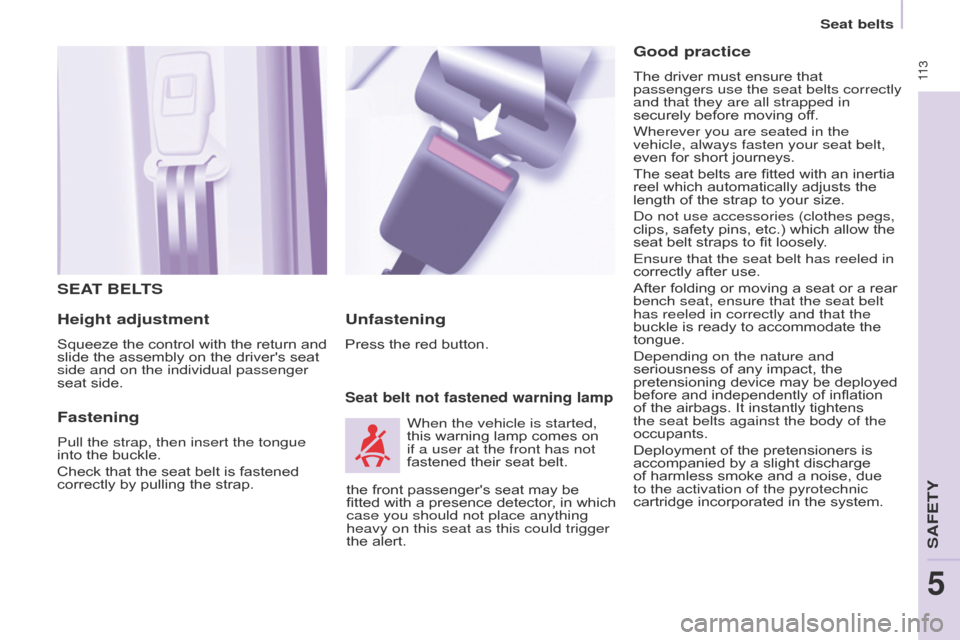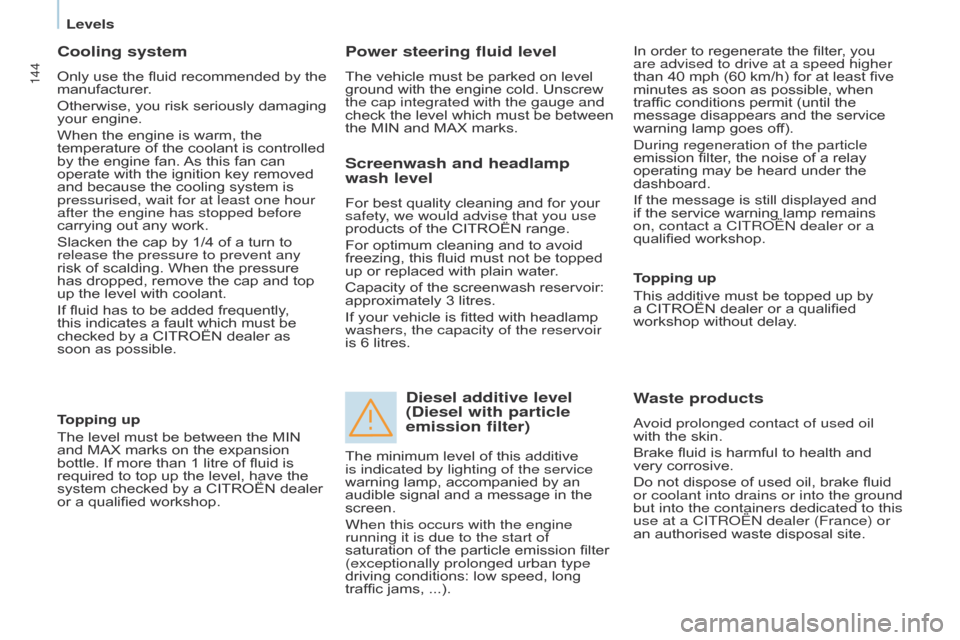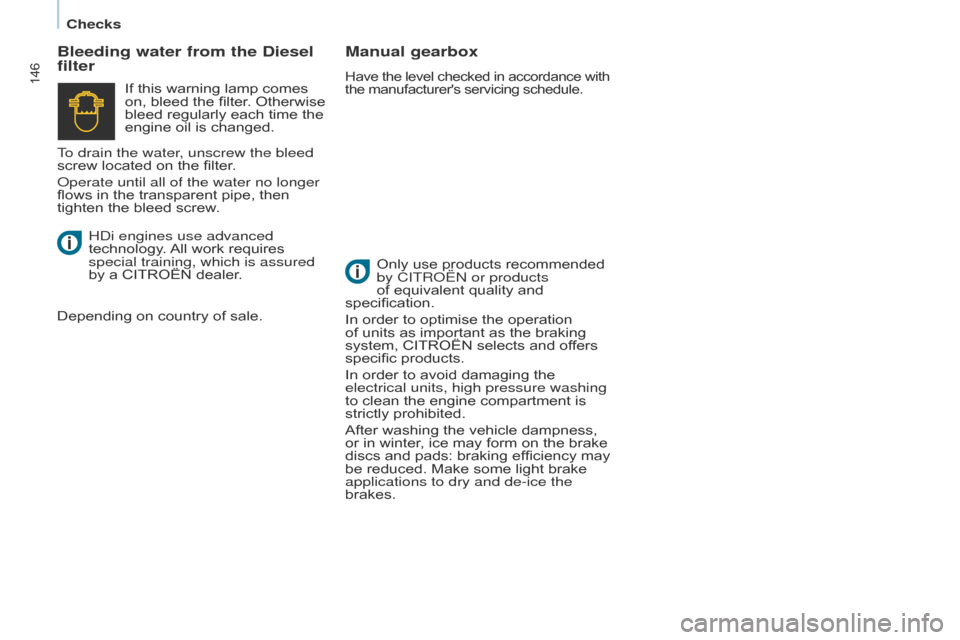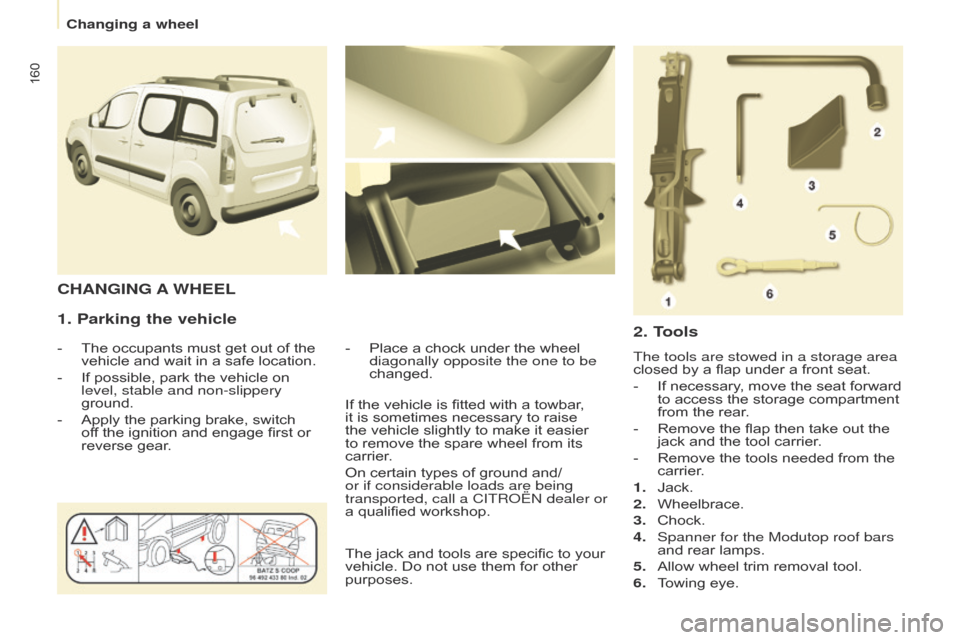light Citroen BERLINGO MULTISPACE RHD 2015 2.G Owner's Guide
[x] Cancel search | Manufacturer: CITROEN, Model Year: 2015, Model line: BERLINGO MULTISPACE RHD, Model: Citroen BERLINGO MULTISPACE RHD 2015 2.GPages: 276, PDF Size: 12.21 MB
Page 115 of 276

Berlingo_2_VP_en_Chap05_Securite_ed02-2014
11 3
SEAt BELt S
Height adjustment
Squeeze the control with the return and slide
the assembly on the driver's seat
side and on the individual passenger
seat
side.
Fastening
Pull the strap, then insert the tongue
into the buckle.
Check
that the seat belt is fastened
correctly
by pulling the strap.
Seat belt not fastened warning lamp
unfastening
Press the red button.
When the vehicle is started,
this
warning lamp comes on
if a user at the front has not
fastened
their seat belt.
Good practice
The driver must ensure that passengers use the seat belts correctly
and that they are all strapped in
securely before moving off.
Wherever you are seated in the
vehicle, always fasten your seat belt,
even
for short journeys.
The
seat belts are fitted with an inertia
reel
which automatically adjusts the
length
of the strap to your size.
d
o not use accessories (clothes pegs,
clips,
safety pins, etc.) which allow the
seat
belt straps to fit loosely.
Ensure that the seat belt has reeled in
correctly
after use.
After
folding or moving a seat or a rear
bench seat, ensure that the seat belt
has reeled in correctly and that the
buckle
is ready to accommodate the
tongue.
d
epending on the nature and
seriousness
of any impact, the
pretensioning
device may be deployed
before
and independently of inflation
of
the airbags. It instantly tightens
the seat belts against the body of the
occupants.
Deployment
of the pretensioners is
accompanied
by a slight discharge
of
harmless smoke and a noise, due
to the activation of the pyrotechnic
cartridge
incorporated in the system.
the
front
passenger's
seat
may
be
fitted
with
a
presence
detector
,
in
which
case you should not place anything
heavy on this seat as this could trigger
the
alert.
Seat belts
SaFETY
5
Page 119 of 276

117
Berlingo_2_VP_en_Chap05_Securite_ed02-2014
Good practice
Sit in a normal upright position.
W ear a correctly adjusted seat belt.
d
o not leave anything between the
occupants and the airbags (a child,
pet,
object...).
This
could hinder the
operation
of the airbags or injure the
occupants.
a
fter an accident or if the vehicle has
been
stolen or broken into, have the
airbag
systems checked.
All
work on the airbag system is strictly
forbidden unless it is carried out by
qualified
personnel at a CITROËN
dealer
or a qualified workshop.
Even if all of the precautions
mentioned
are observed, a risk of
injury
or of minor burns to the head,
chest
or arms when an airbag is
deployed
cannot be ruled out. In fact,
the
bag inflates almost instantly (within
a
few milliseconds) then deflates within
the
same time discharging the hot gas
via
openings provided for this purpose.Lateral airbags
Only
put recommended covers on
the
seats.
These
will not hinder
inflation
of the lateral airbags. Contact
a
CITROËN dealer or a qualified
workshop.
Do
not fix or attach anything to the seat
backs.
This
could cause injury to the
chest
or arms when the lateral airbag
inflates.
d
o not sit with the upper part of the
body any nearer to the door than
necessary.
Front airbags
d
o not drive holding the steering wheel
by
its spokes or resting your hands on
the
centre part of the wheel.
d
o not allow passengers to place
their
feet on the dashboard, they risk
serious
injury if the airbag is deployed.
Smoke
as little as possible as
deployment
of the airbags can cause
burns
or the risk of injury from a
cigarette
or pipe.
Never
remove or pierce the steering
wheel
or hit it violently.
Airbags only operate when the
ignition is switched on.
This
equipment
only
operates
once.
If
a
second
impact
occurs
(during
the
same
or
a
subsequent
accident),
the
airbag
will
not
operate.
The
deployment
of
an
airbag
or
airbags
is
accompanied
by
a
slight
discharge
of
smoke
and
a
noise,
due
to
the
activation of the pyrotechnic cartridge
incorporated
in
the
system.
This
smoke
is
not
harmful,
but
sensitive
individuals
may
experience
some
irritation.
The
noise
of
the
detonation
may
result
in a slight loss of hearing for a short
time. The
passenger's
front
airbag
must
be deactivated if a child seat is
installed
facing
rearward.
Chapter 5, "Children on board"
section.
airbags
SaFETY
5
Page 142 of 276

140
Berlingo_2_VP_en_Chap07_Verification_ed02-2014
OPEnInG tHE BOnnEt
Bonnet stay
Secure the stay in its location,
identified by a sticker on the right-hand
side of the vehicle, to hold the bonnet
open.
Before closing the bonnet, put the stay
back
in its clip without using excessive
force.
On the outside
Raise the bonnet slightly by reaching
in a flat hand, palm down, to make
access
to the lever easier.
With this hand, push the safety catch
to
the left. Raise the bonnet.
On the inside
Pull the lever below the dashboard
towards you. The bonnet is released.
to close
Lower the bonnet and release it at the
end of its travel. Check that the bonnet
is
secure.
avoid opening the bonnet in strong
winds.
opening the bonnet
Page 146 of 276

Berlingo_2_VP_en_Chap07_Verification_ed02-2014
144
cooling system
Only use the fluid recommended by the manufacturer.
Otherwise,
you risk seriously damaging
your
engine.
When
the engine is warm, the
temperature
of the coolant is controlled
by
the engine fan.
As
this fan can
operate
with the ignition key removed
and
because the cooling system is
pressurised, wait for at least one hour
after the engine has stopped before
carrying
out any work.
Slacken
the cap by 1/4 of a turn to
release the pressure to prevent any
risk
of scalding. When the pressure
has
dropped, remove the cap and top
up
the level with coolant.
If
fluid has to be added frequently,
this
indicates a fault which must be
checked
by a CITROËN dealer as
soon
as possible.
Power steering fluid level
The vehicle must be parked on level ground with the engine cold. Unscrew
the cap integrated with the gauge and
check
the level which must be between
the
MIN and MAX marks. In
order to regenerate the filter, you are advised to drive at a speed higher
than
40 mph (60 km/h) for at least five minutes
as soon as possible, when
traffic
conditions permit (until the
message
disappears and the service
warning
lamp goes off).
d
uring regeneration of the particle
emission
filter, the noise of a relay
operating
may be heard under the
dashboard.
If
the message is still displayed and
if
the service warning lamp remains
on, contact a CITR
o Ë n dealer or a
qualified
workshop.
topping up
The
level
must
be
between
the
MIN
and
MAX
marks
on
the
expansion
bottle.
If
more
than
1
litre
of
fluid
is
required
to
top
up
the
level,
have
the
system
checked
by
a
CITROËN
dealer
or
a
qualified
workshop.
Screenwash and headlamp
wash level
For best quality cleaning and for your safety , we would advise that you use
products
of the CITROËN range.
For
optimum cleaning and to avoid
freezing,
this fluid must not be topped
up
or replaced with plain water.
Capacity
of the screenwash reservoir:
approximately
3 litres.
If
your vehicle is fitted with headlamp
washers, the capacity of the reservoir
is
6 litres.
diesel additive level
( d iesel with particle
emission filter)
topping up
This additive must be topped up by
a
CITROËN dealer or a qualified
workshop
without delay.
Waste products
avoid prolonged contact of used oil
with the skin.
Brake
fluid is harmful to health and
very
corrosive.
Do
not dispose of used oil, brake fluid
or coolant into drains or into the ground
but into the containers dedicated to this
use at a CITR
o Ë n dealer (France) or
an
authorised waste disposal site.
The
minimum
level
of
this
additive
is indicated by lighting of the service
warning
lamp,
accompanied
by
an
audible
signal
and
a
message
in
the
screen.
When this occurs with the engine
running it is due to the start of
saturation
of
the
particle
emission
filter
(exceptionally prolonged urban type
driving
conditions:
low
speed,
long
traffic
jams,
...).
Levels
Page 148 of 276

Berlingo_2_VP_en_Chap07_Verification_ed02-2014
146
Bleeding water from the diesel
filter Manual gearbox
Have the level checked in accordance with the
manufacturer's servicing schedule.
Only use products recommended by CITRo Ë n or products
of
equivalent quality and
specification.
In
order to optimise the operation
of
units as important as the braking
system,
CITROËN selects and offers
specific
products.
In
order to avoid damaging the
electrical units, high pressure washing
to
clean the engine compartment is
strictly
prohibited.
After
washing the vehicle dampness,
or
in
winter, ice may form on the brake
discs
and pads: braking efficiency may
be
reduced. Make some light brake
applications to dry and de-ice the
brakes.
If
this
warning
lamp
comes
on,
bleed
the
filter.
Otherwise
bleed
regularly
each
time
the
engine
oil
is
changed.
H
d
i engines use advanced
technology.
All
work
requires
special training, which is assured
by
a
CITROËN
dealer.
Depending
on
country
of
sale.
To drain the water, unscrew the bleed
screw
located
on
the
filter.
o
perate until all of the water no longer
flows
in
the
transparent
pipe,
then
tighten
the
bleed
screw.
checks
Page 149 of 276

Berlingo_2_VP_en_Chap07_Verification_ed02-2014
147
FILLInG WItH FuEL
Low fuel level
Filling
The fuel tank must be filled with the
engine off.
-
Open
the fuel filler flap.
-
Insert
the key, then turn it a quarter
turn.
-
Remove
the cap and hook it onto
the clip located on the inside of the
flap.
When
filling with fuel, a
mechanical
system prevents
opening
of the left-hand side door.
When
the fuel filler flap is open, ensure
that
no one tries to slide this door.
Once
the flap has been closed, the
sliding
side door may jam, push the
door
to close it then open it.
When
the
minimum
fuel
tank
level is reached, this warning
lamp
comes
on.
You then have
approximately 8 litres of
fuel
remaining.
Fill
up
without
delay
to
avoid
running
out
of
fuel.
Never
risk
driving
until
you
run
out
of
fuel
as
this
may
damage
the
emissions
control
and
injection
systems. A
label affixed to the inside of the flap
reminds
you of the type of fuel to be
used.
Y
ou must fill with at least 5 litres of fuel
for
it to be registered by the fuel gauge.
When
the fuel filler cap is opened,
there
may be a slight air suction noise.
This
vacuum is entirely normal and is
due
to the sealing of the fuel circuit.
When
filling the fuel tank, do not
continue after the 3rd cut-off of the
nozzle.
This
could
cause malfunctions.
The
capacity
of
the
fuel tank is
approximately
60
litres.
-
After
filling
the
fuel tank, lock the
cap
and
close
the flap.
Fuel used for petrol engines
The petrol engines are compatible with E10 bio-petrol (containing 10 %
ethanol), conforming to European
standards
EN 228 and EN 15376.
E85 type fuels (containing up to 85 %
ethanol) are reserved exclusively for
vehicles
marketed for the use of this
type
of fuel (BioFlex vehicles).
The
quality
of the ethanol must comply with
European
standard EN 15293.
Fuel
cHEcKS
7
Page 157 of 276

Berlingo_2_VP_en_Chap07_Verification_ed02-2014
155
recommendations on storage
a
dBlue® freezes at about -11°C and
deteriorates above 25°C. It is
recommended
that bottles be stored in
a
cool
area and protected from direct
sunlight.
Under these conditions, the additive
can
be
kept for at least a year.
If the additive has frozen, can be used
once
it
has completely thawed out.
n
ever store bottles of
a
dBlue
® in
your
vehicle. Procedure
Before topping-up, ensure that the
vehicle
is parked on a flat and level
surface.
In wintry conditions, ensure that
the
temperature of the vehicle is
above -1
1°C. Otherwise, by freezing,
the
a dBlue
® cannot be poured into its
tank.
Park
your vehicle in a warmer
area for a few hours to allow the top-up
to
be
carried out.
F
Switch
off the ignition and remove
the
key. -
For access to the a
dBlue
® tank, open
the
filler
flap;
the
AdBlue® filler cap is located to the left of the fuel
filler
cap
-
T
urn
the
blue
cap
a
6
th of a turn
anti-clockwise.
-
Lift
off
the
blue
cap.
adBlue® additive
CHECkS
7
Page 162 of 276

Berlingo_2_VP_en_Chap08_aide-rapide_ed02-2014
160
1. Parking the vehicle
- The occupants must get out of the vehicle
and wait in a safe location.
-
If
possible, park the vehicle on
level, stable and non-slippery
ground.
-
Apply
the parking brake, switch
of
f the ignition and engage first or
reverse
gear. -
Place a chock under the wheel diagonally opposite the one to be
changed.
cHAnGInG A WHEEL
2. t
ools
The tools are stowed in a storage area
closed by a flap under a front seat.
-
If
necessary, move the seat forward
to
access the storage compartment
from
the rear.
-
Remove
the flap then take out the
jack
and the tool carrier.
-
Remove
the tools needed from the
carrier
.
1.
Jack.
2.
Wheelbrace.
3.
Chock.
4.
Spanner for the Modutop roof bars
and
rear lamps.
5.
Allow
wheel trim removal tool.
6.
T
owing eye.
If
the
vehicle
is
fitted
with
a
towbar,
it
is
sometimes
necessary
to
raise
the
vehicle
slightly
to
make
it
easier
to
remove
the
spare
wheel
from
its
carrier
.
On
certain
types
of
ground
and/
or if considerable loads are being
transported, call a CITR
o
Ë
n
dealer or
a
qualified
workshop.
The
jack
and
tools
are
specific
to
your
vehicle.
Do
not
use
them
for
other
purposes.
Changing a wheel
Page 170 of 276

Berlingo_2_VP_en_Chap08_aide-rapide_ed02-2014
168
cHAnGInG A BuLB
type A
All glass bulb: pull gently
as
it is fitted by pressure.
High pressure washing
Open the bonnet. T o access the bulbs, reach
behind the headlamp unit.
Carry out the operations in reverse
order
to refit each bulb and check that
the
bonnet is closed securely.type c
Halogen
bulb: release the
retaining
spring from its
housing.
type B
Bayonet
bulb: press
on the bulb then turn it
anticlockwise.
Halogen
bulbs must be changed with
the headlamp off. Wait a few
minutes
(risk of serious burns).
d
o not touch the bulb directly with your
fingers,
use lint-free cloths.
It
is normal for condensation to form
inside
the headlamps. Regular use of
the
vehicle eliminates this misting.The
bulbs must be changed with
the ignition of
f or with the battery
disconnected. Wait approximately
3 minutes
after changing the bulb
before
reconnecting the battery.
Check that the lamps operate correctly
after
each operation.
When using this type of washing
on stubborn dirt, do not persist on
the headlamps, the lamps and their
edges
to avoid damaging their coating
and
seals.
types of bulb
Various types of bulb are fitted to your vehicle.
T o remove them:
type
d
Light
emitting diode
(LED):
for replacement
of
the daytime running
lamps,
contact a
CITR
o Ë n dealer or a
qualified
workshop.
Changing a bulb
Page 171 of 276

Berlingo_2_VP_en_Chap08_aide-rapide_ed02-2014
169
3. d irection indicators
type B
, PY21W - 21W (amber)
-
Remove
the cover by pulling the
flexible
rubber tab.
-
T
urn the bulb holder a quarter
turn
anticlockwise.
-
Remove
the bulb by pressing
it lightly while turning it
anticlockwise.
-
Change
the bulb.
-
Ensure
that the cover is refitted
correctly all round to assure
correct
sealing.
2.
Sidelamps
type A
, W5W - 5W
-
Remove
the
cover
by
pulling
the
flexible
rubber
tab.
-
Remove
the
bulb
holder
fitted
by
pressure
by
pullin
g
the
connector
.
-
Change
the
bulb.
-
Ensure
that
the
cover
is
refitted
correctly all round to assure
correct
sealing.
FrOnt LAMPS
1. d ipped / Main beam headlamps
type
c , H4 - 55W
-
Remove
the centre cover by
pullin
g the flexible rubber tab.
-
d isconnect the electrical
connector.
-
Release
the retaining tab.
-
Change
the bulb taking care
to
align the metal part with the
grooves
on the lamp.
-
Reposition
the retaining tab.
-
Ensure
that the cover is refitted
correctly all round to assure
correct
sealing.
Changing a bulb
QUICk HELP
8